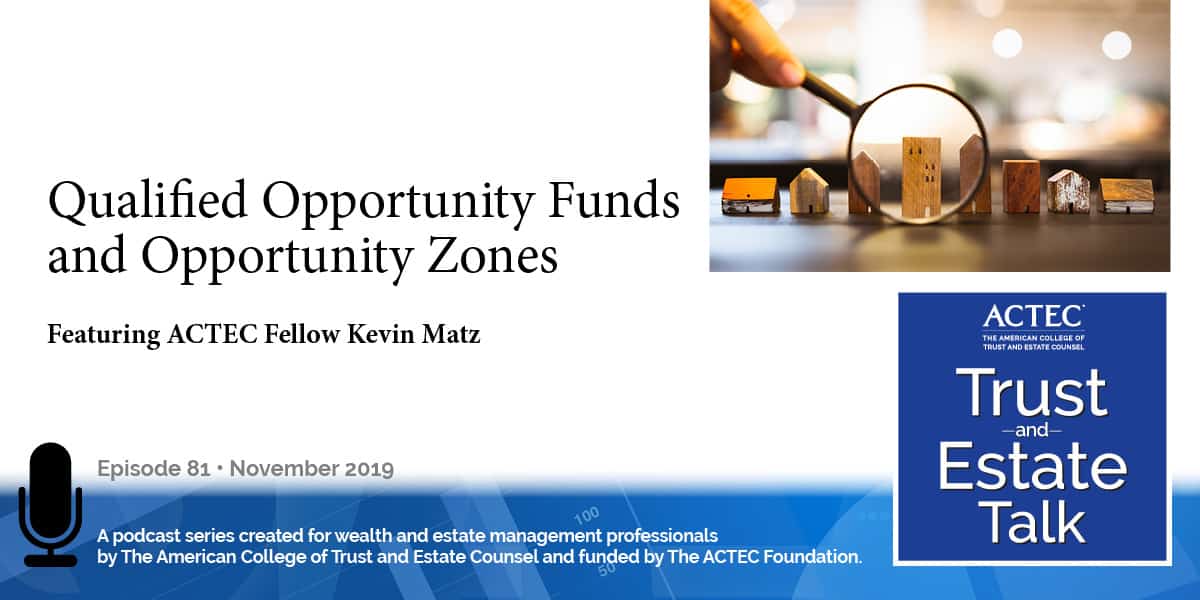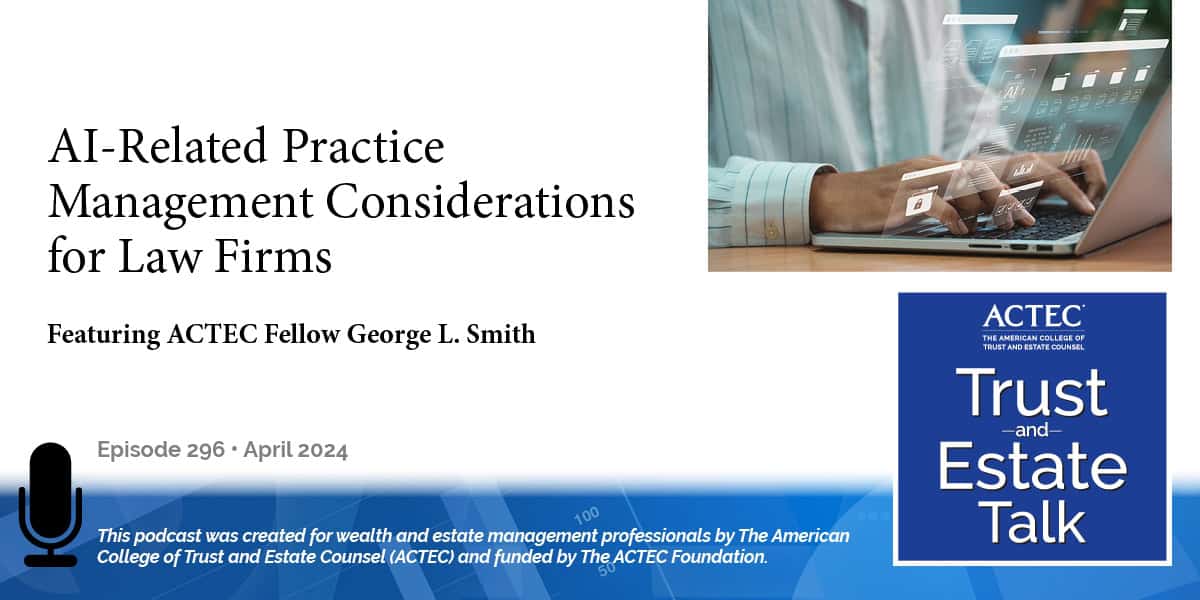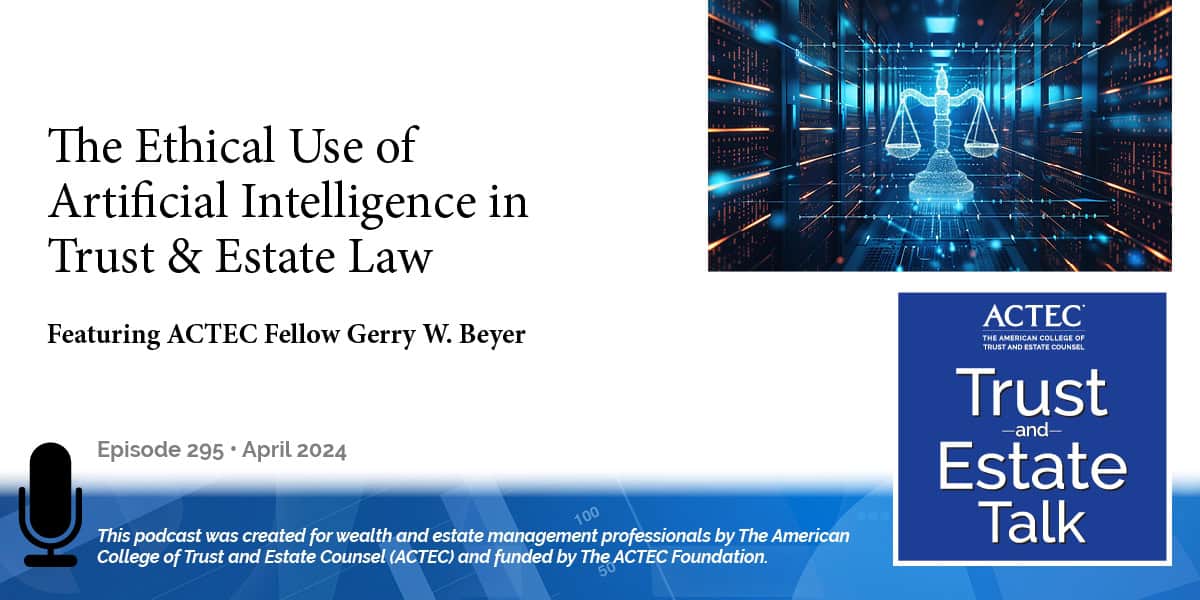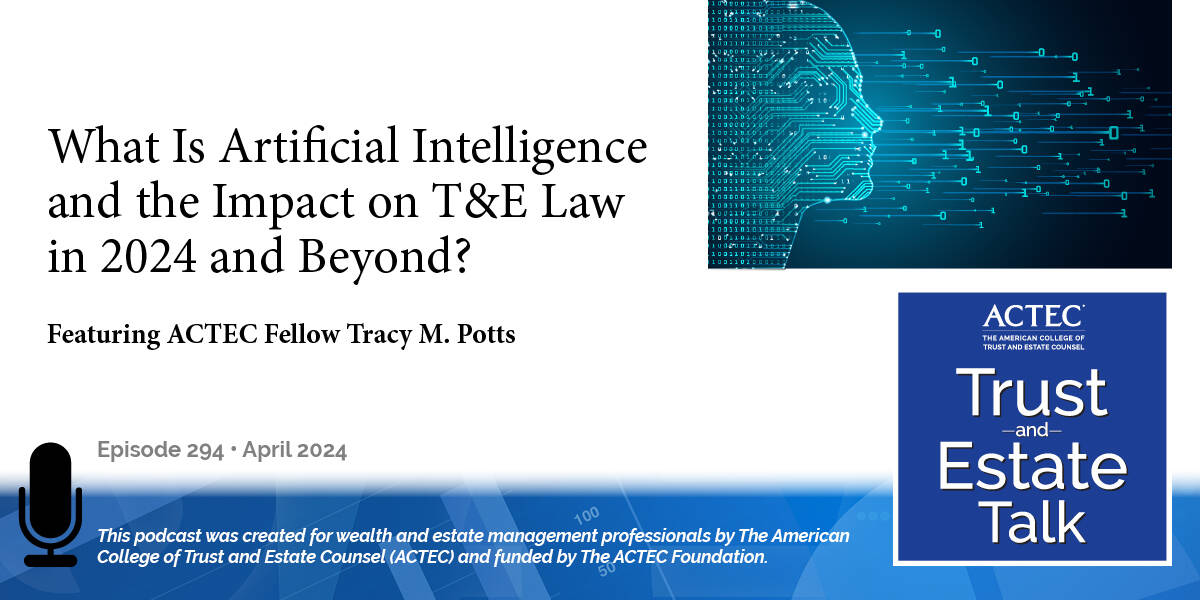Qualified Opportunity Funds and Opportunity Zones

“Qualified Opportunity Funds and Opportunity Zones,” that is the subject of today’s ACTEC Trust and Estate Talk.
Transcript/Show Notes
This is Travis Hayes, ACTEC Fellow from Naples, Florida. ACTEC filed a comment letter with the Treasury Department in June on Qualified Opportunity Funds and Opportunity Zones, and the Treasury Department held a public hearing on the topic in July. For an update on this hot topic, you will be hearing today from ACTEC Fellow, Kevin Matz of New York City. Welcome Kevin.
Thank you, Travis. Well, this is a very hot topic and as you mentioned,
Travis, ACTEC has, in fact, filed a comment letter with Department of Treasury. In fact, it has filed two comment letters on each of two sets of tranches of proposed regulations that have been issued.
- ACTEC Comments on Proposed Regulations on Qualified Opportunity Funds under Code Section 1400Z-2 (June 27, 2019)
- ACTEC Comments on Treasury Notice 83 Fed. Reg. 54279 (10/29/18): Comments on Proposed Regulations on Qualified Opportunity Funds under Code Section 1400Z-2 (December 27, 2018)
Overview
Our focus through ACTEC is on trust and estate issues. So let me just set the table a little bit and then we will talk about the trust and estate issues that are presented that we commented on and also what I will do is I will provide — because I had the opportunity and it was a wonderful, wonderful experience — to provide testimony at the July 9th public hearing before Treasury. I will also comment on the feedback that was received to the testimony that I provided on behalf of ACTEC. So Qualified Opportunity Zones. What is that about? This is a creature of the 2017 Tax Act, the Tax Cuts and Jobs Act, and included in it — did not get a lot of attention at that time — but included was this provision that is designed to promote investment in so-called economically distressed communities referred to as Opportunity Zones. And very interesting, this is the one provision of the Tax Cuts and Jobs Act that was bipartisan. It was supported, it has been supported. There has been a provision to this effect that has been searching for legislation to be included to going back a number of years, supported among others by Cory Booker, Democratic Senator from New Jersey. There is also a bit of think tank supporting this, going back quite a way, emanating from Silicon Valley including Sean Parker who was among the principals involved with that too.
Investment in Economically Distressed Communities
So, it was included in the Tax Cuts and Jobs Act. Purpose again is to promote investment in economically distressed communities, and how does it do that? It does it in three ways. So basically, it says, we are going to make these investments in these Qualified Opportunity Funds very, very attractive by giving a troika of tax benefits.
Number one, you could defer your capital gains tax with tax in the capital gains. If you happen to invest within 180 days or deemed 180 days in the Qualified Opportunity Fund, and you could defer it all the way until the earlier to occur of 2 dates: One is the sale or exchange of the interest in the Qualified Opportunity Fund, and the second date, the outside date, and I sometimes will refer to it as a judgment day, is December 31, 2026, so earlier of sale or exchange, December 31, 2026. That is the number one first tax benefit, and again, that is without any interest charge whatsoever. So, time value of money is enormous as far as the benefit provided.
Secondly, some of the capital gains tax liability can actually disappear. You start at the way that the system works. It tracks everything through basis, and you start out with zero basis in the Qualified Opportunity Fund. If you happen to hold the interest in the Qualified Opportunity Fund for 5 years, you get a 10 percent step up in basis, which means 10 percent of the capital gains has disappeared. If you happen to hold it for 7 years and that 7 years is prior to December 31, 2026, very importantly, to do that you have to invest by December 31, 2019 under present law to make it to 7 years by then. You get an additional 5 percent step up in basis; 10 percent plus 5 percent is 15 percent of the aggregate. That is, 15 percent of the capital gain has disappeared.
Thirdly, because the purpose of this program is to promote long-term investment in these economically distressed communities through these intermediary entities known as Qualified Opportunity Funds, what Congress wants is a long-term investment structure. And how do they encourage that? In addition to the 5-year and 7-year basis step ups that can occur that I just mentioned, if you happen to hold the investment in the Qualified Opportunity Fund for 10 years, all subsequent appreciation is completely excluded from tax — complete exclusion.
So again, three benefits, deferral tax, interest-free deferral, potentially until December 31, 2026, that is number one. Number two, you have the basis step ups, five-year hold, you get 10 percent, seven-year hold, you get another 5 percent, or 15 percent, so basically eliminate the capital gains that you have. And then thirdly, if you happen to hold the interest for 10 years and it appreciates in value, all that appreciation is completely excluded from tax.
Now the question I get sometimes is, “What happens if it goes down in value?” There is a very taxpayer friendly rule there too that says if it goes down in value, and let’s say December 31, 2026 the value has gone down, at that point in time, the amount of the inclusion is capped at the fair market value of the deferred gain subject to further basis of adjustments that may have occurred. So, if you go down in value, you don’t pay tax on the deferred gain amount. You pay tax on a lesser amount and that is very significant.
Qualified Opportunity Funds and Trust and Estates
Trust and estates world — how do we get interest in this and how is this a focal point for us? Number one, I have clients who will call me not only about their estate planning, wills and trusts and how to plan for that and what happens when they die; but they also say, “What is this about Qualified Opportunity Funds, these Opportunity Zones? Is it true that I can actually defer taxes to 2026? What is the catch there?” And you go through it; you explain, yes, you can do that. There is no interest charged whatsoever. If you have a sale or exchange in the interest prior to then, that will be a triggering event, but otherwise, it is to December 31, 2026. You can maybe, because the 5-year, 7-year holds, have 10 or 15 percent of the deferred gain, disappear and then any exclusions would be subject to complete exclusion if you happen to hold it for 10 years. But what could happen in the trust and estates world? Well, one thing that could happen is someone could die. Right? And if death were to occur, that the statute here — the enacting statute 1400Z-2 and also the second tranche proposed regulations that came out — they address that and they say that statutorily if you die, it is going to be considered income in respect of a decedent under Section 691. Income in respect of a decedent under Section 691, which means death is not going to be a taxable event, but it also preserves the deferred gain amount because when there is income in respect of a decedent, 1014(c) of the Internal Revenue Code says there is no step up in basis for IRD, for income in respect of a decedent. So that is something to consider.
Now, how could that be problematic and how do we get concerned at the ACTEC level and what motivated us to make a comment about this point? Well, what happens is someone under their estate plan says, well, I want to give an interest in the Qualified Opportunity Fund to my nephew, and I am not giving my nephew any other cash. I am just giving nephew, who actually is not particularly well off, the interest in the Qualified Opportunity Fund. Well, what happens come “judgment day, December 31, 2026” if the rich uncle has passed away first and has not separately provided a side fund? Because it is IRD, income in respect of a decedent, no step up in basis, come December 31, 2026, that deferred tax becomes due. It may be 15 percent less as far as the gain to be included. There could be other adjustments over the course of time depending on how the investment is structured, perhaps as a tax partnership. But that tax liability will become due without regard to the fact that the nephew here may not have the cash on hand or the borrowing capacity to pay for the tax. That is a big problem. So, we identified that in our comment letter, and our solution was there should be some sort of relief given. Now at the hearing, the public hearing at Treasury, it was actually just outside Washington, DC on July 9, we raised that. That was the point that I mentioned, and Treasury seemed to understand the issue. And, one of the Treasury officials who was there said, “Well, how would this work, what if we were to have some sort of installment payment plan to allow for the payment of the tax over some period of time?” My response was it sounded like a great idea. So, we will see if the final regulations and by the way, final regulations are promised for later this year. But let’s see the final regulations ultimately address that; but that seemed to indicate some receptiveness from Treasury.
Asset Planning
Now, what else could happen in the trust and estates world? How do we plan with assets, including potentially interest in Qualified Opportunity Funds? Well, we could make gifts of the interest. We could make gifts outright to another person or we could make gifts perhaps to a trust including a grantor trust. What happens there? Well, if you look at the statute, the statute says two triggering events, sale or exchange or judgment day, December 31, 2026; it does not say anything else. I would have thought that gifting would — making a gift unless perhaps you had debt in excess of basis — would not have been a taxable event. However, the second tranche proposed regulations did not say that; they said to the contrary. They said if you happen to make a gift and the gift is not to a grantor trust, that will be an event, an inclusion event, that will cause the deferred gain to then become taxable then. And I remember reading the proposed regs, the second tranche proposed regs. when they came out, first in their unofficial form in mid-April. Ultimately, they were published in the Federal Register on May 1st — and saying, “Wow, that is not consistent with the statute; how are they getting that?”
So we took a look — our committee, our joint committee. We took a look at the preamble to the proposed regs that came out, and the preamble says, well, if you look at congressional history, the Congressional Record on this, it shows that Congress, even though the statute did not say so, was concerned that gifts could be made and unless a gift is to a grantor trust, the rationale being a grantor trust is the same taxpayer as a grantor, so that is a tax nothing, but if we make a gift that is not to a grantor trust, that will be an inclusion event. So, what do we do in our committee? We took a look very thoroughly through the Congressional Record, through the legislative history, and it did not say that. There was some loose language that talked about changes in equity position and dispositions, but the preamble pieced together something that did not seem to be there. So, in our comment letter, we raised that point and said most respectfully, statute doesn’t say that; Congressional Record does not say that there is to be a clear change in existing principles under the tax law as to a gift not being a taxable event. At the Treasury hearing — I mentioned that again — the responses that I received from the officials there, and again this is all in the public record, was okay, but how is there a mechanism to tax the event of somebody receiving a gift? Well, the answer they posited, you tax the donee. It is not very different from the situation where someone dies and then the beneficiary gets taxed at some later date. You simply have a mechanism to tax the donee, so we will see what happens there.
Additional Questions
Now I mentioned that there was an exception to that, and that exception involved if you happen to have a transaction with a grantor trust. Grantor trusts, again, are among our favorite vehicles in estate planning. They are treated under Revenue Ruling 85-13 as one in the same as a grantor. So the thought is, you have a transaction with a grantor trust and it is a tax nothing as long as grantor trust status is maintained including during the grantor’s lifetime. But the actual language of the proposed regs was very interesting. It did not talk about transactions to a grantor trust. It talked about a contribution to a grantor trust. What is a contribution to a grantor trust, I ask? The preamble talks about not a contribution, it talks about a gift. So, it seems like it is talking about a gift, but in our estate planning, we love to have transactions with grantor trusts that are beyond the scope of gifts. We love to sell the grantor trust, maybe take back promissory notes. We love to have GRATs, grantor retained annuity trusts, in which annuity payments going back could be property in kind including interests in Qualified Opportunity Funds. We love to exercise a power substitution that allows us to swap in and swap out assets, and the IRS has blessed that and said that that is not going to be an estate tax includable event as one of the grantor trust triggers written into Section 675(4)(c) of the code.
So, what about those? We mentioned that in our comment letter. Treasury officials who were there said, “You know what, we think it is implied that under principles of 85-13 that should not be a problem.” And I said, “I completely agree, but it would be so helpful when a client comes to me and wants advice on this, if we had something in the final regulations that said that very point.” So hopefully, that will be included; we will see.
Just a couple other minor, but I won’t say minor, but time beckons and I am going to just focus on a couple other points to be raised too. So fourthly, you could have a situation of someone is a partner in a partnership — the partnership tax return including an LLC that taxes a partnership that could also be a trust or estate or an S corporation — that income tax return goes on extension. And the extended return isn’t due until maybe September of that same year, and a K-1 does not get issued until maybe September or thereabouts. What is the problem with that? Well, the problem with that is this: what the proposed regulations say is you have 180 days from either the date of the transaction or deemed date of the transaction, quite often in the partnership setting that could be December 31 of the year, to go ahead and put the funds in basically a fundable amount equal to the capital gain that you have into the Qualified Opportunity Fund in order to qualify for the tax benefits. What happens if you don’t get a K-1 until August or September? Bottom line is you possibly don’t even know about having the capital gain to invest in a Qualified Opportunity Fund until you are too late. So given that the purpose of the statute is to promote economic investment in Opportunity Zones, economically distressed communities would seem to be more consistent with the statute to allow some sort of relief, so that this way, if someone does not, through no fault of their own, does not get word through the K-1 mechanism of this, that they are allowed some sort of extra time allotment. We will see what Treasury does with that in the final regulations.
And then finally, question of basis, basis, basis, basis; this is such an important part of estate planning these days with higher exemptions. So much is focused on the income tax world. While I mentioned before, yet in the statute, it said when death occurs, Section 691 applies, income in respect of a decedent, and under Section 1014(c), there is no step up in basis for income in respect of decedent. So, what does that mean practically here? It means that as to the deferred gain amount, there is no step up in basis, but what happens if there has been growth in the value of the Qualified Opportunity Fund from the initial point of investment in it until the point when the person who made the investment in it dies? At that point in time, income in respect of a decedent principles say that the deferred gain amount, which was previously not taxed, will be taxed at that point in time. But what if there has been appreciation prior to the point of death? What about that? It seems that under the language of the statute, that should be eligible for step up in basis and we have asked for clarification as to that. So those are the points that we raised in our comment letters, some of the reactions received informally from Treasury at the hearing, and it has been represented that we will get final regulations later this year. So, we shall see.
Thank you, Kevin for providing us an update on the new area of Qualified Opportunity Funds and Opportunity Zones.
This podcast was produced by The American College of Trust and Estate Counsel, ACTEC. Listeners, including professionals, should under no circumstances rely upon this information as a substitute for their own research or for obtaining specific legal or tax advice from their own counsel. The material in this podcast is for information purposes only and is not intended to and should not be treated as legal advice or tax advice. The views expressed are those of speakers as of the date noted and not necessarily those of ACTEC or any speaker’s employer or firm. The information, opinions, and recommendations presented in this Podcast are for general information only and any reliance on the information provided in this Podcast is done at your own risk. The entire contents and design of this Podcast, are the property of ACTEC, or used by ACTEC with permission, and are protected under U.S. and international copyright and trademark laws. Except as otherwise provided herein, users of this Podcast may save and use information contained in the Podcast only for personal or other non-commercial, educational purposes. No other use, including, without limitation, reproduction, retransmission or editing, of this Podcast may be made without the prior written permission of The American College of Trust and Estate Counsel.
If you have ideas for a future ACTEC Trust & Estate Talk topic, please contact us at ACTECpodcast@ACTEC.org.
Latest ACTEC Trust and Estate Talk Podcasts

AI-Related Practice Management Considerations for Law Firms
A discussion for law firms about how to incorporate AI in their practice management, including staff considerations, the “billable hour,” and more.

The Ethical Use of Artificial Intelligence in Trust & Estate Law
A law professor offers insights into the risks, rewards, duties and ethical considerations of lawyers using AI in their T&E practices.

What Is Artificial Intelligence and the Impact on T&E Law in 2024 and Beyond?
A primer on the types and uses of AI, then a deeper dive into the impact on trust and estate law from types to applications to ethical considerations.

